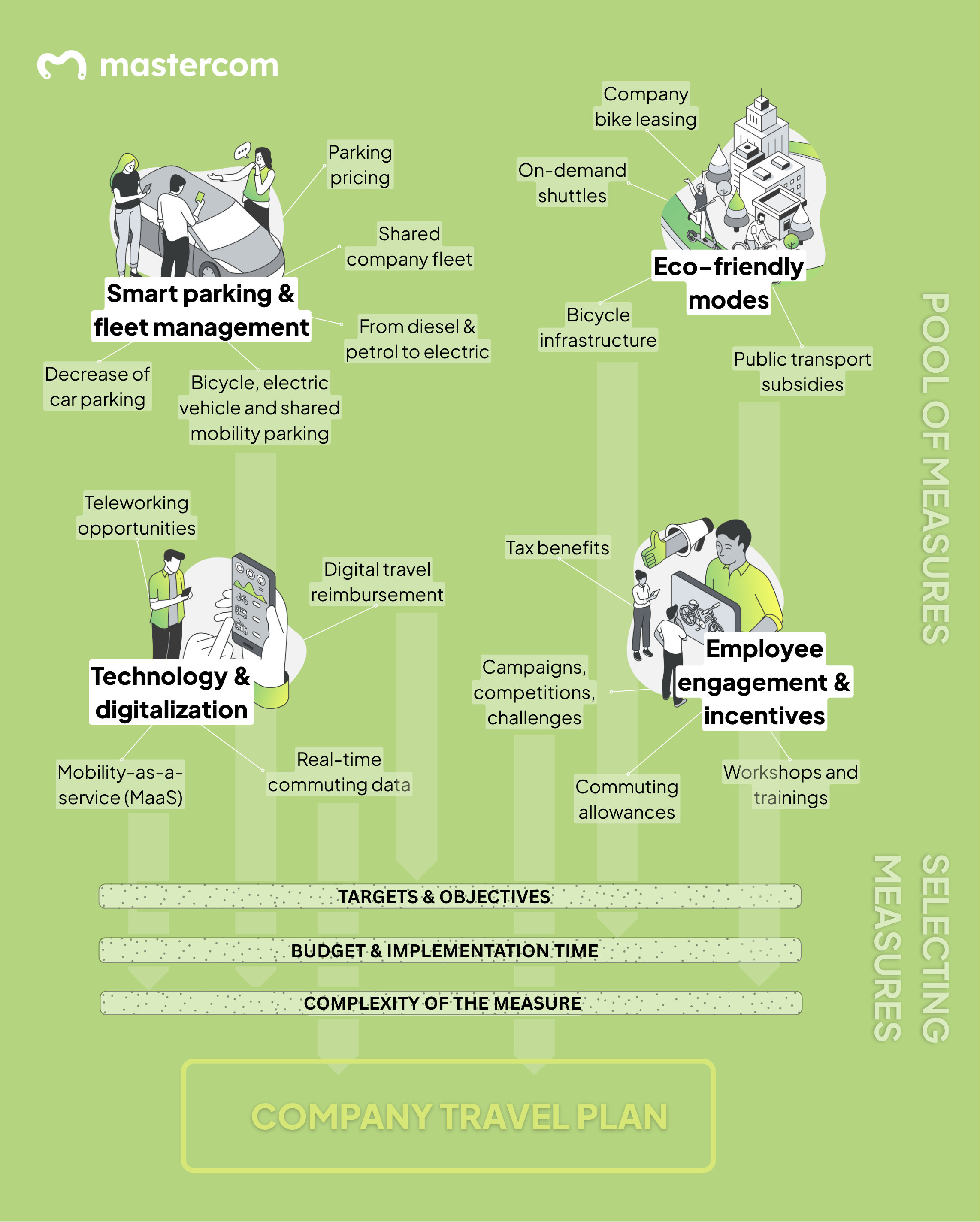Company Travel Plan strategies are gaining traction as the climate crisis intensifies and businesses face a dual mandate: reduce their environmental footprint while future-proofing operations.
Often overlooked, employee commuting represents a pivotal lever for change—where sustainability intersects with cost efficiency, talent retention, and regulatory compliance. After all, the way employees commute to work impacts not only the environment but also their well-being and productivity.
Employee Mobility: Key to Sustainability and Satisfaction
Commuting is a major source of pollution. Research from 2022 found that 50% of European commuters rely on cars, with company vehicles contributing heavily to CO₂ emissions. Alarmingly, commuting accounts for up to 25% of Europe’s total transport-related emissions.
But it’s not just about the environment. Long and inflexible commutes can affect how employees feel at work. They can lead to increased stress, lower job satisfaction, and reduced time for rest or personal responsibilities. According to a 2023 Glassdoor survey, commute quality is now as important as salary when people decide where to work. For employers, mobility becomes a key factor in attracting and retaining talent.
The Opportunity: Mobility as a Strategic Asset
Behind these statistics lies an opportunity. Businesses that rethink employee mobility can improve their environmental impact while simultaneously reducing costs, boosting productivity, and future-proofing their operations.
This article explores the significance of employee commuting management, also known as Corporate Mobility. It explores the benefits and how businesses can take actionable steps toward a more sustainable future by creating a Company Travel Plan.
What’s a Company Travel Plan?
A Company Travel Plan (CTP) is a comprehensive strategy that organisations use to optimise employee commuting and business travel while promoting sustainable and cost-effective mobility solutions. It outlines a company’s mobility policies, incentives, and infrastructure investments, aiming to reduce dependency on private cars and improve overall transportation efficiency. The end goal is to reduce environmental impact, enhance employee well-being and boost company productivity.

A company travel plan promotes sustainable and cost-effective mobility solutions, such as biking to work.
Key Components of a Company Travel Plan
If your company is considering creating a Company Travel Plan, here are some key components to keep in mind and follow.
Mobility manager
Assign a dedicated lead to oversee strategy and compliance.
Understand current mobility patterns
Analyse employee commuting patterns, travel behaviour, existing transport options and willingness to change to more sustainable options.
Define clear targets and goals
Setting measurable objectives (like “Reduce car commutes by 25% in 2 years”) ensures accountability and aligns your CTP with broader ESG or regulatory commitments, turning aspirations into action.
Allocate budget
Dedicating funds to the company’s sustainable mobility plan signals a strong organisational commitment and enables tangible progress, transforming plans from paper to practice.
Define, pilot and implement sustainable mobility initiatives
Implement sustainable mobility solutions that align with your employees’ current mobility patterns, needs, and aspirations.
- Eco-friendly modes: Promotion of cycling, walking, public transport, company shuttles, and other low-emission commuting options.
- Smart parking and fleet management: Optimizing parking demand and transitioning to electric vehicles (EVs) where feasible or incentivise the high-occupancy vehicles with the best parking spots.
- Technology & Digitalisation: Leveraging mobility-as-a-service (MaaS) platforms, digital travel reimbursement systems, mobility budget platforms, carpooling solutions, smart parking management, and real-time commuting data.
- Employee Engagement & Incentives: Encouraging participation through commuting allowances, gamification, and tax benefits for sustainable choices.

Overview of potential measures for a Company Travel Plan (CTP). Source: Own elaboration
The combination of different measures is an essential part of the mobility strategy because offering just one option may not meet everyone’s needs. A diverse strategy provides people with choices and increases the likelihood of lasting change.
Measure, monitor and improve
Create a monitoring strategy to understand the evolution of commuting behaviour among your employees, their satisfaction with the company’s mobility strategies, and the sustainability impact of your Company Travel Plan (CTP). This action is key to ensuring your solutions evolve in the right direction and reach the expected positive impact.
A well-executed Company Travel Plan enhances employee experience, reduces commuting stress, and aligns with urban sustainability goals. Companies that proactively integrate mobility planning into their HR and sustainability strategies position themselves as leaders in smart and green commuting.
How to Create a Company Travel Plan
Creating an effective Company Travel Plan isn’t always straightforward, especially with changing laws across Europe. That’s why Factual, together with VUB and Tractebel Engie and backed by EIT Urban Mobility, developed MASTERCOM EU.
MASTERCOM EU is a hands-on training course that enables companies to design effective travel plans. This year’s edition dives deep into the latest legal updates in France and Spain, combining flexible online learning with live sessions and practical workshops in Lille and Barcelona. It’s a smart way for businesses to stay ahead, meet regulations, and build sustainable mobility strategies that really deliver.

The final event of the 2023 edition of the MASTERCOM EU course in Barcelona
Which companies need a Company Travel Plan?
The landscape of corporate commuting is undergoing a dramatic shift across Europe. What began as voluntary sustainability initiatives has evolved into strict legal requirements—and smart companies are taking notice.
In Brussels, France, and Italy, any business with over 100 employees is required to implement a Company Travel Plan (CTP). Spain is following suit, with the national Sustainable Mobility Law on the way, which will apply to firms with 250 or more workers. While Spain prepares national CTP rules, Catalonia is already moving ahead. Under its 2027 Air Quality Plan, workplaces with more than 200 employees are required to submit their CTPs, locally known as PDEs (Plan de Desplaçaments d’Empresa), for official approval.
But this goes beyond national regulations. The EU’s Corporate Sustainability Reporting Directive (CSRD) has raised the bar across the board. Under Scope 3, category 7 “Employee commuting” large companies and listed SMEs (Small and Medium-sized Enterprises) must measure and publicly report commuting emissions if they make up more than 5% of their total emissions.
Forward-thinking companies are discovering that strong CTPs bring more than compliance. They also deliver real business value by:
- Improving their Environmental, Social and Governance (ESG) scores
- Boosting employee satisfaction, attraction and retention
- Future-proof operations
Whether your business is required to comply today or simply planning for tomorrow, the message is clear: sustainable commuting is no longer optional. If you’re ready to take the next step, join companies across Europe by enrolling in the MASTERCOM EU programme for Spain or France – your practical guide to designing effective Company Travel Plans. Secure your spot today and lead the way in smart corporate mobility.




